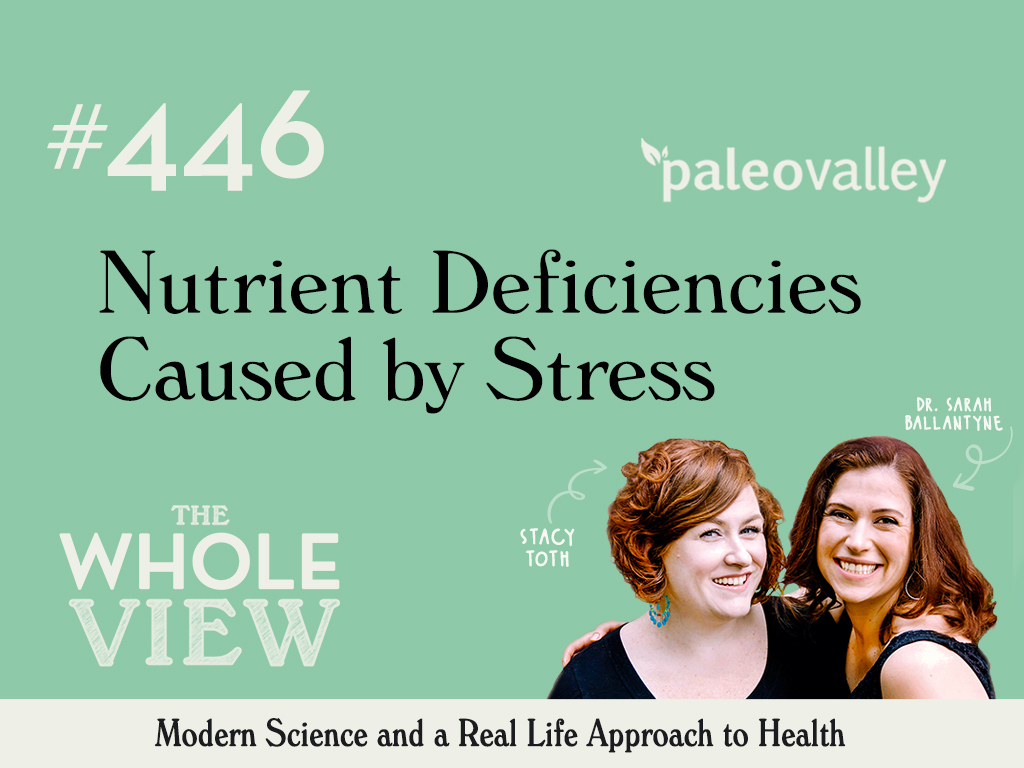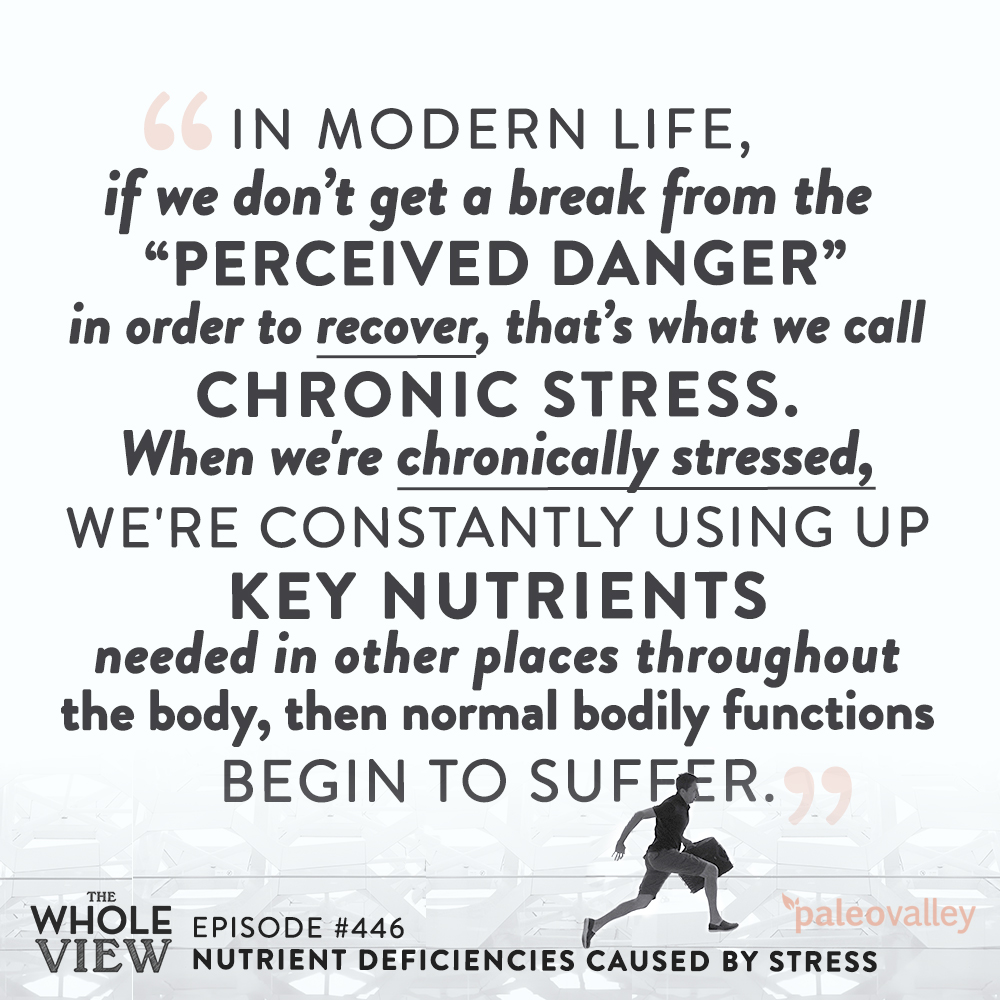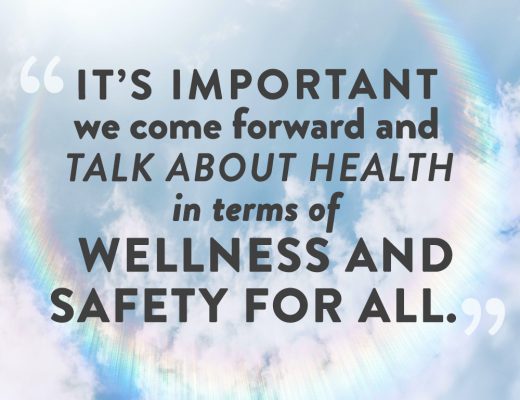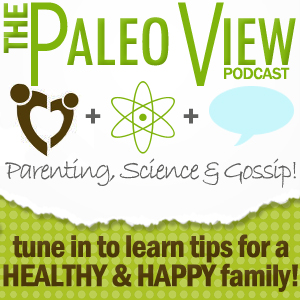
Welcome to episode 446 of The Whole View! This week, Stacy and Sarah break down nutrient deficiencies caused by stress and its effects on the body. They go through the most common nutrient deficiencies in adults and offer helpful insight into what you can do to help.
If you enjoy the show, please review it on iTunes!
The Whole View, Episode 446: Nutrient Deficiencies Caused by Stress
Welcome back to episode 446! (0:28)
This show is a direct follow-up to last week, where Stacy and Sarah talked about supplementing while on AIP and the philosophies that couple different strategies together.
In that episode, Sarah mentioned certain nutrients, such as Magnesium and Vitamin C, which depleted during times of chronic stress.
Paleovalley also has a great Central C Complex, a great source of Vitamin C, and they agreed to sponsor this show!
Stacy shares that she uses many products from Paleovalley and highly recommends this brand because they make their products from Whole Foods.
Studies have shown that supplementing with Vitamin C can support a healthy stress response, which in turn can help improve sleep, regulate appetite, improve immune function, lower cardiovascular disease risk, improve depressive and anxiety symptoms, and even reduce migraine headaches!
Nearly half of Americans aren’t getting enough daily! Plus, infection, inflammation, and stress all increase our vitamin C needs.
Why PaleoValley?
Sarah and Stacy both love and regularly use Paleovalley products. (7:35)
Paleovalley’s complex uses three food-based vitamin C sources: unripe acerola cherry, camu camu berry, and amla berry. This means you get the full spectrum of nutrients, minerals, and bioflavonoids from Whole Foods.
Food-based vitamin C has concurrent phytonutrients that make this type of vitamin C up to 2.5X more bioavailable.
Even though it’s bioidentical to non-synthetic Vitamin C, many people with sensitivities to corn aren’t able to take synthetic vitamin C.
Paleovalley uses no synthetic (GMO corn-derived) vitamin C in their complex! Plus, there are no wonky fillers, and it uses a simple gelatin capsule.
Review of the Stress Response
Stacy expresses how excited she is for Sarah to get into what exactly she’s been putting her body through all these years! (8:04)
Sarah and Stacy did a deep dive into how chronic stress impacts health in TPV Podcast Episode 351: Stress on Health.
A stressor is a chemical or biological agent, environmental condition, external stimulus, or event that activates the hypothalamic-pituitary-adrenal axis (HPA axis) and releases stress hormones.
Stressors:
- Physical (e.g., injury, a vigorous workout, sitting for prolonged periods, not getting enough sleep, extreme environmental temperatures)
- Sensory (e.g., loud noises, too-bright lights, overcrowding)
- Chemical (e.g., tobacco, alcohol, drugs, allergens)
- Psychological (e.g., deadlines, traffic, bills, societal and family demands)
This is responsible for our fight-or-flight response caused by complex communication between three organs:
- The hypothalamus: The part of the brain located just above the brain stem. It’s responsible for the autonomic nervous system, such as regulating body temperature, hunger, thirst, fatigue, sleep, and circadian rhythms.
- The pituitary gland: A pea-shaped gland located below the hypothalamus. It secretes hormones, such as thyroid-stimulating hormone, human growth hormone, and adrenocorticotropic hormone.
- The adrenal glands: Small, conical organs on top of the kidneys. It secretes hormones, such as cortisol, epinephrine (also known as adrenaline), norepinephrine, and androgens.
This response helped our early ancestors pay closer attention, run away faster, or jumpstart healing in times of crisis.
It also reduces the effectiveness of bodily functions the body aren’t crucial to survival in that moment, such as our digestive or reproduction systems.
Nutrient Deficiencies Caused by Stress in the Modern Era
Sarah explains that the body doesn’t differentiate between types of stress.
So when we experience acute stress over long periods, such as at our jobs or physical stress, our body is constantly shutting down those “non-necessary” functions because it’s in chronic survival mode.
In modern life, when we never have a break from stress where our bodies can return to baseline, we suffer from what’s called “chronic stress.”
The brain borrows hormones from other functions to make things we need in a crisis. All of that together is why chronic stress is so problematic to lifelong health.
If we’re chronically stressed, we’re constantly using up key nutrients we need to perform their normal jobs in our body.
Lifestyle factors are very important to managing chronic stress and nutrient replenishment, and getting enough sleep.
Anxiety is a consequence of chronic stress. Chronic stress can also increase the risk of depression, cardiovascular disease, obesity, diabetes, autoimmune diseases, chronic headaches, memory problems, digestive problems, infections, and poor wound healing.
Plus, chronic stress influences other behaviors, influencing our food choices (due to cravings for energy-dense foods and increased appetite). This can make us more vulnerable to addiction.
Sarah references these shows for more information on anxiety:
Nutrient Deficiencies Caused by Stress
When Sarah talks about nutrient deficiencies caused by stress, she means normal, run-of-the-mill chronic stress, not the mental health challenges that can arise from chronic stress. (19:30)
She also recommends this review paper for more information on the effects of stress on the body: https://pubmed.ncbi.nlm.nih.gov/31504084/
Sarah decides to start with the nutrients with the most evidence of depletion by the stress response.
Magnesium
More than three hundred different enzymes in your cells need magnesium to work.
This includes every enzyme that uses or synthesizes ATP and including enzymes that synthesize DNA and RNA.
It is also a constituent of bones and teeth, is important for neuromuscular contractions, and is necessary for testosterone and progesterone production.
It is important for the metabolism of phosphorus, calcium, potassium, sodium, B-complex vitamins, and vitamins C and E.
Magnesium is also a cofactor in methylation and is necessary for detoxification functions.
Numerous animal studies showed that serum reduced magnesium concentration and increased urinary magnesium excretion in animals exposed to acute and chronic stress. Studies in humans show the same thing.
A 2006 study reported increased urinary magnesium excretion in university students during their examination period compared with the beginning of their academic term, correlating with self-reported anxiety.
Another study conducted in 2000 showed significant decreases in plasma ionized magnesium and total magnesium concentrations in young volunteers exposed to chronic stress or subchronic stress.
In a 2015 study designed to simulate a Mars mission, a 6-man crew was kept in isolation. The study recorded numbers of all magnesium measures with the biggest effect between days 0 and 30.
Similar studies have shown magnesium reduction in response to sleep deprivation stress, physical stress (marathons), and environmental stress (loud noise for 4 hours).
Sarah sums up that magnesium depletion shows the same results no matter what kind of stressor is triggering it.
If you’re looking for more information about magnesium, Stacy and Sarah did a whole show on it!
Vitamin C
Vitamin C is mainly an antioxidant and an enzyme cofactor. (28:00)
As an antioxidant, vitamin C is essential in protecting proteins, lipids, carbohydrates, nucleic acids, and more from damage by free radicals and reactive oxygen species.
Vitamin C is also used as an enzyme cofactor to generate critical compounds for joint and bone health, such as collagen. Plus, it helps to generate neurotransmitters like dopamine and serotonin!
Vitamin C’s role as an enzyme cofactor is likely why it’s so important for the stress response due to cortisol and catecholamines production.
The main catecholamines are epinephrine (adrenaline), norepinephrine (noradrenaline), and dopamine.
Adrenal glands store A LOT of vitamin C. (source)
An important 2007 study in humans showed that ACTH causes adrenal glands to secrete vitamin C and cortisol.
It’s thought that this release of vitamin C helps protect the brain from the behavioral effects of stress by preventing maladaptations (like anxiety and depression).
Zinc
Zinc is the second most abundant metal in the body. It has many important roles, including nearly every cellular function. (37:07)
It is essential for the “reading” of the DNA map to make proteins. And it controls gene expression and communication within cells and the production of proteins.
It is important for the absorption and activity of B vitamins, required for muscle contraction, and needed in insulin and testosterone production.
Collagen formation, a healthy immune system, and the body’s ability to heal from wounds also depend on zinc.
It also plays a role in skin health and maintaining sensory organs (which links zinc deficiency with loss of smell and taste) and is a vital nutrient for immune system function.
Several animal studies show that chronic stress decreases serum zinc concentrations and some tissue-specific zinc stores.
Sarah adds that there aren’t many human studies, but general data shows similar findings.
A 1991 study measured plasma zinc concentrations before and after 5 days of sustained stress in Navy SEAL trainees (“Hell Week”). Plasma zinc levels decreased by 33% at the end of the 5 days but returned to baseline 7 days later.
There have been similar decreases in zinc measured in released POWs.
There is an even larger body of evidence with physical stress, like endurance sports.
Iron
Iron is a critical component of hemoglobin. This is a protein in red blood cells responsible for carrying oxygen from the lungs to cells in the body. (44:20)
Heme is a critical component of a family of proteins involved in protection from oxidative damage.
Iron is also needed to metabolize B vitamins, is a necessary cofactor for various enzymes, and is important in protein metabolism.
Animal studies show chronic stress can decrease serum iron concentrations, ferritin, whole blood iron concentration, and hemoglobin. Sarah adds there are limited studies in humans.
In that same Navy Seal study, iron concentrations decreased by 44%. Ferritin concentrations increased by 59% after 5 days of Hell Week.
And a 2018 study of maternal perceived stress during pregnancy showed an increased risk for low neonatal iron at delivery and storage iron depletion at one year.
In physical stress, a 1990 study showed decreased ferritin.
However, studies in trained athletes don’t show this. This indicates that there’s some sort of adaptation to increased physical fitness.
Calcium
In addition to forming bone, calcium is essential to many processes, including neurotransmitter release and muscle contraction. (48:15)
Calcium also helps to regulate the constriction/relaxation of blood vessels, nerve impulses, muscle contraction, and secretion of hormones like insulin.
Sarah reminds listeners that bones are remodeled continuously throughout our lives. A hormone called parathyroid hormone (PTH) closely regulates the amount of calcium in our blood.
It does this by occasionally “borrowing” calcium from bones that will hopefully get deposited back if there is enough calcium intake. In this case, there are more robust human data than animal studies.
Previously mentioned 2000 study of young volunteers exposed to chronic stress showed significant decreases in plasma calcium concentrations.
In the previously mentioned Mars simulation study, total serum calcium concentrations decreased by 16% from baseline after 30 days of isolation. It then stabilized at these lower concentrations during the remaining 75 days.
Niacin (B3)
Vitamin B3 is a water-soluble B complex vitamin and used in all cellular metabolism within our mitochondria. (53:30)
We need it to produce energy from any macronutrient (fat, protein, or carbohydrate).
Specifically, vitamin B3 is necessary for oxidation-reduction reactions, which involves transferring electrons across a membrane in the mitochondria.
Plus, B3 is used to produce many molecules important for health (like cholesterol and L-carnitine), which is important for lipid metabolism specifically.
Vitamin B3 helps improve circulation, aids the body in manufacturing various stress and sex hormones, and suppresses inflammation.
One study identified the effects of cold exposure, calculation exercise, and dark exposure on niacin metabolism in female adults.
Cold exposure significantly increased the urinary excretory output of niacin metabolites, although no change in urinary niacin concentrations was found after exposure to mental or emotional stress.
Nutrient Deficiencies that Magnify Stress
Sarah moves away from nutrient deficiencies caused by stress for a moment to talk about deficiencies that can actually magnify stress. (56:56)
If you don’t have these to start with and are then exposed to stress, results show it can make stress worse.
Omega-3
A 2018 study associated HPA-axis dysregulation with lower n-3 PUFA, especially DHA, plasma levels.
Another separate 2017 study confirms this is specific to DHA, not EPA, and EPA supplementation did not reduce stress levels.
A 2004 study showed DHA supplement has an adaptogenic effect on stress. A significant reduction in perceived stress is supplemented with 6 g of fish oil containing 1.5 g per day DHA, while the placebo group is supplemented with olive oil.
Stacy and Sarah have talked about omega-3 supplementation specifically in episode TWV Podcast Episode 415: Fish oil, Healthy or not?
Vitamin C
Sarah explains that the link between vitamin C and stress is a two-way street. (59:35)
Guinea pigs made deficient in vitamin C hyper-secrete cortisol (source).
Another study in rats showed vitamin C (equivalent to 2-3 grams in people) blunted cortisol secretion in response to stress (source).
Supplementation of ascorbic acid in humans is associated with a decreased cortisol response after a psychological or physical stressor (source).
Also, Vitamin C deficiency is widely associated with stress-related diseases! (source)
Several reports have suggested a relationship between behavior under stress and ascorbic acid.
A 2015 study in high-school students with anxiety, given 500mg vitamin C daily or placebo, showed a reduction in perceived stress and heart rate.
Sarah briefly covers several more studies referenced here:
- 1. https://www.sciencedirect.com/science/article/pii/0009898175902508
- 2. https://europepmc.org/article/med/1963054
- 3. https://bmcpsychiatry.biomedcentral.com/articles/10.1186/s12888-020-02730-w
- 4. https://pubmed.ncbi.nlm.nih.gov/31001107/
Sarah adds that higher vitamin C levels increase cognition, and it doesn’t matter if it’s by food or supplement!
Vitamin C is on Both Sides of the Equation!
Vitamin C is so important because it both regulates the stress response and is depleted by stress. So low Vitamin C can become a snowball of badness.
Also, nearly half of Americans aren’t getting enough daily! Plus, infection, inflammation, and stress all increase our vitamin C needs.
Although synthetic and food-derived vitamin C is chemically identical, fruit and vegetables are rich in numerous nutrients and phytochemicals, which may influence its bioavailability.
Sarah briefly covers several other studies referenced here for more information:
- 1. https://www.ncbi.nlm.nih.gov/pmc/articles/PMC3847730/
- 2. www.researchgate.net/profile/Joe-Vinson-3/publication/242087621
- 3. https://pubmed.ncbi.nlm.nih.gov/18915110/
- 4. https://www.ncbi.nlm.nih.gov/pmc/articles/PMC3847730/#B68-nutrients-05-04284
Final Thoughts
Stacy tells listeners that there will be more bonus content on this topic over on their Patreon channel. (1:05:01)
So for anyone curious as to what Stacy and Sarah really think about nutrient deficiencies caused by stress, it’s definitely worth checking out on Patreon.
She also thanks Paleovalley for sponsoring this week’s show.
Be sure to check out their vitamin C complex and bone broth proteins – both of which are Stacy’s and Sarah’s favorites.
Stacy reminds the audience that many vitamin C products use corn-sourced products. She is sensitive to that, and finding Paleovalley’s supplements was a blessing.
She and Sarah only partner with brands that they love, use, and are confident in recommending.
Stacy adds they she loves their organ complex and meat sticks as well!
Thank you so much and we will see you next week!





